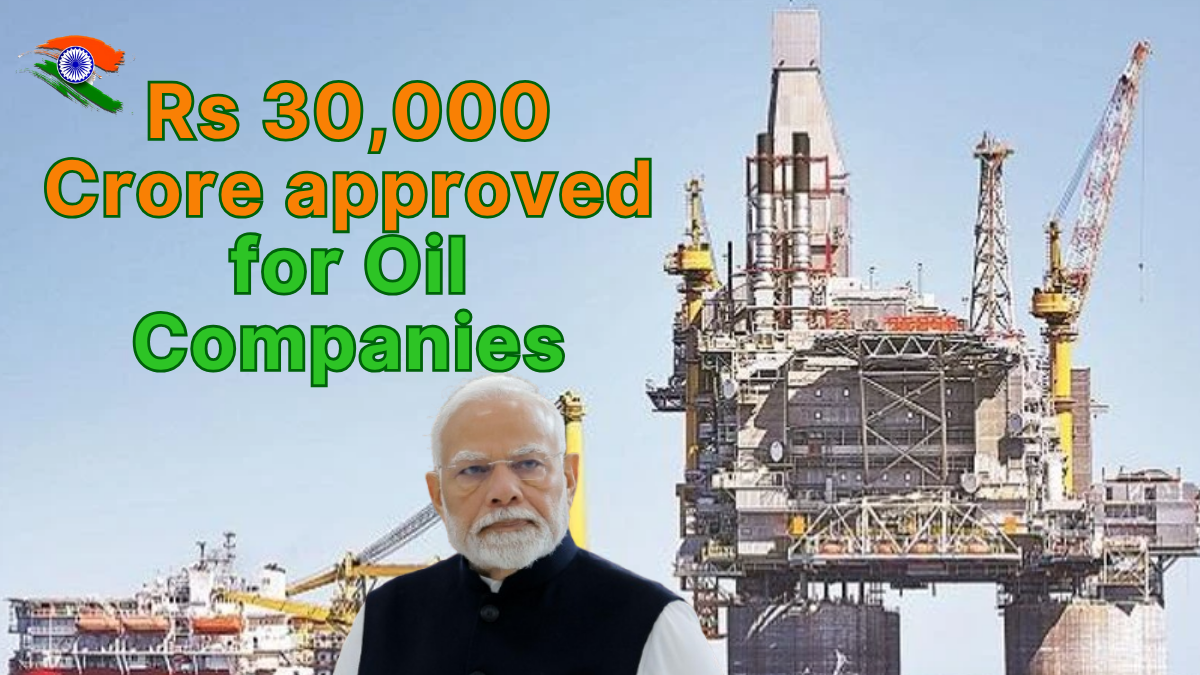Amidst rising financial strain on India’s public sector Oil Marketing Companies (OMCs), the central government is expected to approve a Rs 30,000-35,000 crore compensation package to offset mounting losses on subsidized LPG cylinders under the Ujjwala scheme. According to a report by CNBC-TV18, this major fiscal intervention is likely to be approved in the Cabinet meeting scheduled for today.

If approved, the move would provide substantial relief to Bharat Petroleum (BPCL), Hindustan Petroleum (HPCL), and Indian Oil Corporation (IOC)—the three key players burdened with the cost of selling LPG cylinders below market rates.
Quick Summary: Cabinet Decision on LPG Compensation
| Key Detail | Information |
|---|---|
| Proposed Compensation Amount | Rs 30,000 to Rs 35,000 crore |
| Beneficiaries | Indian Oil Corporation (IOC), Bharat Petroleum (BPCL), Hindustan Petroleum (HPCL) |
| Reason for Compensation | Under-recovery due to Ujjwala LPG subsidy scheme |
| Estimated FY25 Losses | Rs 41,000 crore on LPG cylinder sales |
| Current Cylinder Loss | Approximately Rs 200 per cylinder |
| LPG Price Adjustment | Rs 50 hike, but losses persist |
| Proposed Disbursal Mode | In tranches during the financial year |
| Expected Approval Timeline | Likely to be approved in today’s cabinet meeting |
| Official Source | https://petroleum.nic.in |
The Ujjwala Scheme and Its Impact on Oil Marketing Companies
The Pradhan Mantri Ujjwala Yojana (PMUY) has been instrumental in providing clean cooking fuel to millions of households across India, especially in rural and underprivileged areas. However, the cost of maintaining subsidies on LPG cylinders has heavily impacted the profitability of public sector oil firms.
Losses in FY25
In FY2024-25, OMCs reportedly incurred losses of Rs 41,000 crore due to the continued sale of LPG cylinders at rates below the actual cost. Despite a recent price hike of Rs 50, the companies continue to suffer a per-cylinder loss of about Rs 200.
These under-recoveries have placed significant stress on company balance sheets and are believed to be a key factor behind the proposed compensation package.
Proposed Compensation Plan: Rs 30,000 Crore in Tranches
According to CNBC-TV18 sources, the government is considering a tranche-based payment structure to support the oil companies throughout the financial year. This would allow companies to receive periodic payments rather than a one-time end-of-year bailout.
Key Points of the Proposed Payment Structure:
- Total Compensation: Rs 30,000 to Rs 35,000 crore
- Payment Mode: Quarterly or seasonal tranches
- First Tranche: Likely during the winter session of Parliament or earlier
This structure ensures faster liquidity support and minimizes the impact on company operations, especially during high-demand seasons.
Why the Relief Is Crucial Now
The global energy landscape remains volatile, with fluctuating oil prices and evolving subsidy policies. Despite the recent LPG price hike, OMCs continue to face significant revenue gaps due to:
- Rising international LPG costs
- Continued domestic subsidization under welfare schemes
- Geopolitical uncertainties affecting global fuel trade
The expected cabinet approval comes at a time when these companies are struggling to maintain operational efficiency and capital expenditure plans.
Market Reactions and Investor Outlook
Although the Ministry of Petroleum and Natural Gas has not officially confirmed the compensation plan, investor attention has already shifted toward the likely impact on OMC stock prices.
Shares of BPCL, HPCL, and IOC are expected to react positively if the Cabinet clears the compensation. Analysts suggest that a stable cash flow backed by government support could improve earnings outlook and reduce fiscal pressure on these public sector undertakings.
Previous Compensation Trends
This is not the first time the government has stepped in to compensate oil firms:
- In 2022, the government released Rs 22,000 crore as a one-time payment to cover past LPG subsidy losses.
- Similar compensations were offered during global crude oil spikes and pandemic-induced price freezes.
The current proposed package is among the largest in recent years and highlights the government’s balancing act between social welfare and financial stability of public enterprises.
Frequently Asked Questions (FAQs)
Q1. What is the purpose of the Rs 30,000 crore compensation?
Ans. The compensation aims to cover losses incurred by OMCs from selling LPG cylinders at subsidized rates under the Ujjwala scheme.
Q2. Which companies are expected to benefit?
Ans. Indian Oil Corporation, Bharat Petroleum, and Hindustan Petroleum are the primary beneficiaries.
Q3. Will the compensation be paid in a lump sum?
Ans. No. The government is planning to disburse the funds in tranches over the financial year.
Q4. How much are the OMCs currently losing per LPG cylinder?
Ans. Despite a Rs 50 hike, the companies continue to incur a loss of around Rs 200 per cylinder.
Q5. Where can I check official updates?
Ans. For verified announcements, visit the Ministry of Petroleum and Natural Gas website: https://petroleum.nic.in
Conclusion: A Timely Lifeline for Public Sector Oil Firms
The anticipated Cabinet approval of Rs 30,000 crore compensation for LPG subsidy losses marks a critical intervention by the Indian government to safeguard the financial health of its core public sector oil firms. At a time when global energy markets remain unstable and domestic welfare schemes are crucial, this move is expected to balance economic imperatives with social commitments.
If cleared, the relief package will not only stabilize the operations of BPCL, HPCL, and IOC but also ensure the continued success of flagship initiatives like PM Ujjwala Yojana. The coming weeks will be crucial in determining how this support shapes market sentiment and future subsidy policies.
For More Information Click HERE






